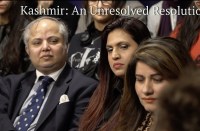When school shootings occur in the United States, there exists a tendency among observers from foreign nations to first offer sympathy to the victims before then launching into criticisms of America’s gun culture. This gun culture of course dates back to the drafting of the Second Amendment to the US Constitution which guarantees the right of all Americans to bear arms. While most school shooting in the US are carried out with weapons stolen from family members or other adults while others are carried out with weapons purchased on the black market, yesterday’s school shooting and bombing in the southern Russian city of Kerch was carried out with a homemade bomb and a legally obtained hunting gun.
While Russia tends to have tougher laws on civilian gun purchases than do many US states, this did not stop a clearly psychopathic 18 year old student at Kerch Polytechnical College from slaughtering 21 innocent children while wounding over 50. While some of the differences between Russian and American culture are vast and while Russian and American gun laws are also different, this did not stop an event from happening in Crimea which was eerily similar to a recent shooting in Florida.
The lesson implicit in this is that gun laws and cultural differences alone cannot explain the presence or absence of psychotic young killers inflicting violence against their peers in what should be safe school environments. Other factors in such tragic events which are present in multiple cultures including in both the US and Russia ought to be carefully reviewed in order to understand that there exist common themes among school shooters that are far more profound than cultural and legal differences between regions and nations. Most school shooters tend to come from broken home and many were abused as young children. While certainly not all abused children from broken homes become killers, the presence of drugs (both legal and illegal drugs) as well as alcohol tend to overwhelming play contributing factors in turning sad children into mad and wicked children.
As early reports indicate that the killer from Kerch was obsessed with American school shooters and serial killers, the idea that Russia is so far removed from the US in terms of cultural dynamics is a fact that has been clearly exaggerated for the sake of points scoring by both “sides” in the New Cold War. The reality is that while Russia has economically and socially stabilised since the 1990s, Russia like many other nations still has a high divorce rate, as does much of the US. Furthermore, while the US is leading the global league table of shame in terms of drug use, Russia is no stranger to drugs and is certainly no stranger to alcohol abuse, even though fortunately the number of health problems in Russia caused by alcohol has decreased in recent years.
Thus while any Cold War style atmosphere makes it attractive or even “exciting” to emphasise the differences between Russia and the US, at a human level, the world would benefit grateful from an eschewing of the “us versus them” mentality so that people in all cultures can look at universal social ills and find ways to fix these problems in accordance with local cultural characteristics. Sadly, the US President has not so much as paid his respects to the victims of the atrocity at the Kerch school.
A world that breaks down trading barriers and embraces cultural exchange is one that at the very least has the potential for greater peace - both in terms military action and in terms of lone wolf attacks which are often caused by the madness derived from drugs and other social ills. While the US trade war’s short term effects are to make many nations poorer, a more open attitude could help to enrich the material lives of all while similar programmes of cultural openness could help make the wealth worth having beyond mere questions of subsistence.
The silent reaction to the Kerch school massacre from the United States seems to vindicate the words of Leo Tolstoy who said “All happy families are alike; each unhappy family is unhappy in its own way”. And yet over a century after these words were written, it appears that the racism implicit in any Cold War style conflict has shoved empathy into a corner and disallowed American and Russian policy makers and civic leaders from turning to one another and saying “we grieve for one another and we seek to learn from one another”.
In this sense, the tragedy in Kerch is also a tragedy for a world that refuses to express empathy for those who are not as dissimilar as they might seem, just because of prevailing narratives that seek to dehumanise those on the other side of a useless and reactionary geopolitical divide.


